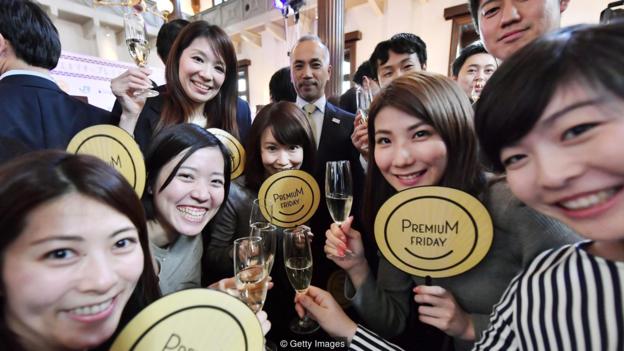导读:日本一直以过劳文化而著称。为了缓解这种局面,日本政府出台补贴周五政策,让大家提前下班,但是这个政策真的奏效吗?

In February, Tokyo-based public relations firm Sunny Side Up announced employees could leave work early on the last Friday of every month.
二月,位于东京的公关公司Sunny Side Up宣布员工可以在每月最后一个周五提前下班。
The problem? Nobody wanted to go. Despite the company’s announcement, it seemed like everyone would stay at their desks anyway.
问题是?没人想走。无视公司的宣布,似乎每个人都想呆在办公桌前。
“It is not the Japanese way,” explains Ryuta Hattori, head of the company’s global communications department. “In the Japanese working culture, we work so hard and work so many hours and nobody takes off early. ”
公司全球通信部门负责人Ryuta Hattori解释说:“这不是日本方式。在日本工作文化中,我们工作很努力,工作很长时间,没人提前下班。”
The idea is part of a new Japanese government initative, launched on 24 February, designed to tackle the country’s infamous culture of long hours and overwork. once a month on Premium Friday, as it’s known, employees are encouraged to leave work at 15:00 in the hopes some free time will reduce workplace stress. It’s turned out to be more difficult than it sounds.
这个想法是2月24日发布的新日本政府倡议的一部分,该倡议旨在解决该国臭名昭着的长时间和过度劳累的文化。据了解,每月一次的补贴周五,鼓励员工下午三点结束工作,以期望这些空闲时间能减轻工作场所的压力。但是这变得比听起来更难。
At Hattori’s company, where the corporate slogan is ‘let’s have fun,’ incentives were needed to push workers out the door. “We had to give them bonuses,” he says.
在Hattori的公司,公司的口号是“让我们开心”,需要激励来鼓励员工下班。 “我们不得不给他们奖金,”他说。
Any employee who agreed to leave their desk at 15:00 on Premium Friday received envelopes with 3,200 yen, or $28. Some of them headed to an izakaya, a Japanese-style pub that also serves small plates of food, while others went off to play football.
任何同意在补贴周五下午三点下班的员工,收到一个装有3200日元(28美元)的信封。其中有些人前往供应小盘食物的日式酒吧,另外一些人则去踢足球。
Still, many people at other companies remain unsure about logging off prematurely. While cutting out early might sound like a glorious plan to workers in other countries, in Japan the Premium Friday initiative has been met with trepidation. The country’s hopes of easing an overworked population has instead only seemed to highlight what can happen when workers are pushed too far.
然而,很多其他公司的人仍对提早下班不确定。对其他国家的员工来说,提前下班听起来是个辉煌的计划,但是在日本,补贴周五倡议遇到恐惧。日本希望减轻过劳人口的期望似乎强调了过度压榨员工会发生什么。
First, the boss
首先,老板
Late on a Tuesday afternoon, Gian Nomachi pushed a cart full of empty bento boxes outside a medical research park in Japan’s Hyōgo Prefecture. She delivers the lunches; because workers leave their desks for meals.
周四下午晚些时候,Gian Nomachi在日本兵库县的医学研究园区外面推着一个装满空饭盒的车子。她在送午餐;因为员工们下班吃饭。
“I would like to take part in Premium Friday, but there is no way,” Nomachi, 26, said as she stacked the colourful boxes in the back of the van. “This is impossible. It is impossible to leave work early.”
26岁的Nomachi一边往车后面堆放五彩缤纷的盒子,一边说:“我想参加补贴周五,但是不行。这不可能。没法提前下班。”
Maybe she would if her boss took part, she says. But until that happens, no worker would dare to be the first to check out.
如果她的老板参加了,可能她会参加。但是直到老板参加前,没有员工敢第一个下班。
That’s a typical outlook in Japan, a country where workers rack up long days with or without being paid overtime, says Parissa Haghirian, professor of Japanese management at Sophia University in Tokyo.
东京索菲亚大学日本管理教授帕里莎·哈吉里安(Parissa Haghirian)说,这是日本的一个典型的景象。
Partly it’s due to a worker shortage, so everyone is overworked, Haghirian says. “There’s a very practical reason why Japanese work so long… there’s not enough people to do all the work,” Haghirian says. “In a company where there isn’t enough people, you can’t say some should go home early because you wouldn’t have enough people to complete tasks.”
哈吉里安说,这部分由于员工短缺,因此每个人过度工作。Haghirian说:“这是一个非常实际的原因,为什么日本人工作时间这么长……没有足够的人从事各种工作。在没有充足人手的公司,你不能说一些人早回家,因为你将没有足够的人手来完成任务。”
But Japan’s hard-working culture has also reached crisis levels, causing the government to act. A series of deaths linked to working too hard, called karōshi in Japanese, brought the notorious Japanese obsession with work into the spotlight.
但是日本的过劳文化已经达到了灾难程度,导致政府行动了。一系列死亡与工作幸苦相关,日本人把这称为karōshi,这把臭名昭著的日本人沉溺工作变成了焦点。
One high-profile example was the suicide of Matsuri Takahashi, a 24-year-old ad executive who leapt to her death on Christmas Day in 2015. She had been working a 100-plus hours a month in overtime and left a note for her mother that read: “Why do things have to be so hard?”
一个备受瞩目的例子就是24岁的广告主管Matsuri Takahashi在2015年圣诞节自杀。她一个月超时工作一百多个小时,给妈妈留下一个便签这样写道:“为什么事情这么艰难?”
She was one of 2,159 workers that year whose deaths or suicides were ruled to have been caused by overworking. In October, the government released a report that showed a quarter of companies had workers clocking 80 hours or more of overtime a month.
她是当年2159名被判定为由于过度工作造成死亡或者自杀的员工之一。十月,政府发布报告,显示四分之一的公司让员工每月超时工作80小时以上。
In response, Prime Minister Shinzo Abe sought ways to lighten the country’s workload, including encouraging workers to take part in Premium Friday starting in February.
对此,首相安倍晋三寻求减轻国家工作量的办法,包括鼓励工人从二月开始参加补贴周五。
Two Premium Fridays later, and few companies had taken part. Last month, Premium Friday landed right in the middle of cherry blossom season, a springtime ritual when locals and tourists head to parks and temples to spot the pink flowering trees. But, it was also the last day of the Japanese fiscal year, meaning many companies were too busy to let employees leave.
两个补贴周五过后,一些公司参与其中了。上个月,补贴周五恰逢樱花节中期,在这个春季仪式里,当地人和游客前往公园和寺庙观赏粉色的樱花树。但是,这也是日本财政年最后一天,这意味着很多公司很忙,不能让员工离开。
The social pressure to remain at your desk as long as a colleague is still there, means people often stay late into the night. And that’s unlikely to change even with the Premium Friday encouragement.
只要你的一个同事还在上班,你的办公桌前就仍有社会压力,这意味着人们经常待到晚上。即便有补贴周五鼓励,这也不可能改变。







